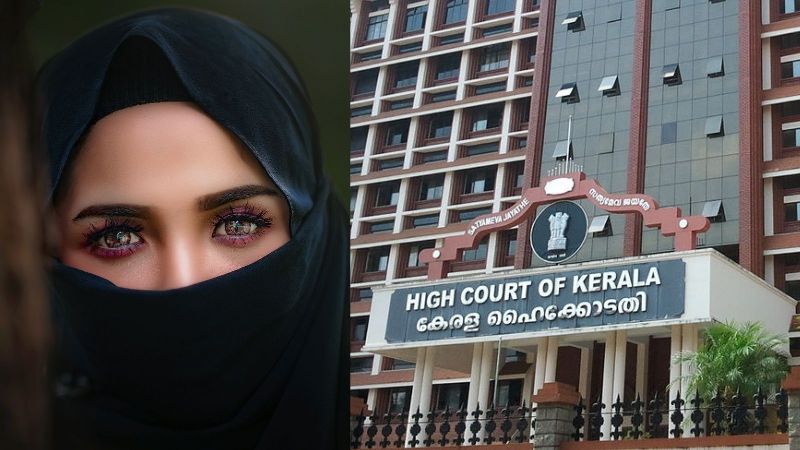In a landmark ruling, the Karnataka High Court uphold the hijab ban and stated that wearing hijab is not an ‘essential religious practice’. The court rejected a collection of pleas filed by Muslim girls from Udipi who sought the right to wear hijabs in institutions along with their uniforms. The Karnataka High Court bench also stated that the restrictions on wearing hijabs was reasonable and the students can’t oppose the same.
“We are of the considered opinion that wearing of hijab by Muslim women does not form a part of essential religious practice in Islamic faith,” the Karnataka High Court bench ruled. “We are of the considered opinion that the prescription of a school uniform is a reasonable restriction constitutionally permissible which the students cannot object to,” the bench further stated.
The issue regarding the ban on hijab, which media later dubbed as the Karnataka hijab row, emerged earlier on January 1 when Muslim students in PU college in Udipi were asked to remove their hijab to attend the classes.
The Facts of the Matter
The ongoing Karnataka hijab row came to a decisive turning point today with the Karnataka High Court upholding the Karnataka government’s order on a complete ban of religious clothes, including hijabs and saffron clothes at educational institutes. The judgement came from a complete Karnataka High Court bench comprising of Justice Krishna S Dixit and Justice J M Khazi, and Justice Ritu Raj Awasthi.
The Karnataka Hijab Row Explained
Earlier on February 5, the Karnataka government issued an order where it banned clothes that can “disturb equality, integrity and public order”, at educational institutes. According to news agency ANI the February 5 order read, “Colleges that are under the dept of Pre-University, state government to follow the dress which was decided by the college’s development board (CDC). If there is no such dress code, students can wear the dress which will not affect equality, integrity and law and order.”
Challenging the same, Muslim girl students from Pre-University college in Udipi filed petitions, seeking the right to wear hijabs or head-scarves at educational institutes. On March 15, the Karnataka High Court rejected the batch of pleas, and upheld the government’s order.
Also Read: Bollywood Actor Swara Bhasker Trolled for Taking Dig at The Kashmir Files Director Vivek Agnihotri
Karnataka HC Upholds Ban on Religious Clothes
We are of the considered opinion that wearing of the hijab by Muslim women does not make up an essential religious practice in Islamic faith,” the bench of Karnataka High Court read. “We are of the considered opinion that the prescription of a school uniform is a reasonable restriction constitutionally permissible which the students cannot object to,” the bench comprising of Karnataka chief justice Ritu Raj Awasthi and Justice Krishna S. Dixit, and Justice K. M. Khazi ruled.
Court Formulated Four Questions to Pass Judgement
In order to take a “holistic view” of the dispute, the court formulated four questions. The first question is – whether wearing the hijab is an essential religious practice under the Article 25 of the Indian constitution?
The second question – Whether the prescription of uniform is not permissible as it violates the petitioners’ fundamental rights guaranteed under various articles of Indian constitution?
The third question – Whether the government’s order from February 5 is incompetent and arbitrary which violates article 14 and 15 of the constitution?
The fourth question – “Whether any case is made out in a petition for ordering an inquiry against respondents 6 to 14 and for issuance of a writ of quo warranto against the respondents 15 and 16,” as quoted by an Indian Express report.
Also Read: Bengaluru Man Sues Restaurant for 40 Paise Overcharge, Court Slaps him with Rs 4,000 Fine
The Answers to the Four Question
The Karnataka HC bench stated that wearing hijab by Muslim women do not make up as “essential religious practice in Islamic faith”. Further, the prescription of school uniform is reasonable and thus, can’t be objected to.
For the third question, the bench added that the government has indeed the power to issue the order that was issued earlier on February 5.
For the fourth question, the HC bench stated, “The answer to the fourth question is no case is made out in writ petition 2146/2022 for issuance of a direction for initiating disciplinary action against respondents six to 14 and for issuance of writ or quo warranto against respondents 15 and 16. They are rejected as being not maintainable,” as quoted by an Indian Express report.
Follow Us on Instagram | Twitter | Facebook | YouTube
























